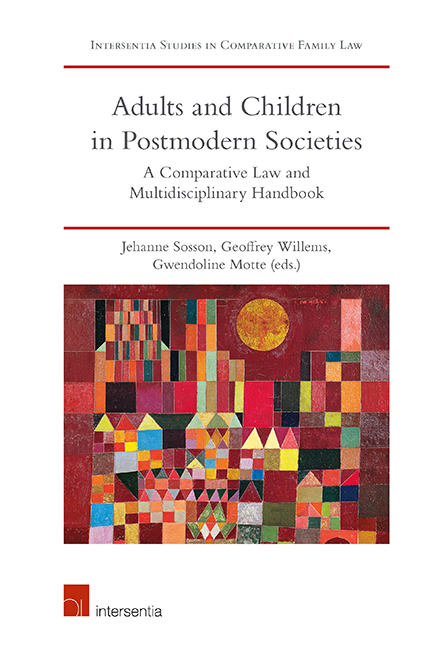Book contents
- Frontmatter
- Contents
- List of Cases
- List of Contributors
- Introduction
- PART I NATIONAL REPORTS ON LEGAL REGULATIONS OF RELATIONSHIPS BETWEEN ADULTS AND CHILDREN
- PART II INTERDISCIPLINARY APPROACH
- PART III INTERNATIONAL LAW INSIGHTS
- International Human Rights Law as a Basis for Reconstructing Legal Relationships between Adults and Children
- Private International Law as a Basis for Reconstructing Legal Relationships between Adults and Children: Four Illustrations
- PART IV COMPARATIVE APPROACH
- General Conclusion: The Challenge of Transparent and Inclusive Parenthood/Parentality in a Pluralist and Cosmopolitan Context
- About the Editors
International Human Rights Law as a Basis for Reconstructing Legal Relationships between Adults and Children
from PART III - INTERNATIONAL LAW INSIGHTS
Published online by Cambridge University Press: 26 June 2019
- Frontmatter
- Contents
- List of Cases
- List of Contributors
- Introduction
- PART I NATIONAL REPORTS ON LEGAL REGULATIONS OF RELATIONSHIPS BETWEEN ADULTS AND CHILDREN
- PART II INTERDISCIPLINARY APPROACH
- PART III INTERNATIONAL LAW INSIGHTS
- International Human Rights Law as a Basis for Reconstructing Legal Relationships between Adults and Children
- Private International Law as a Basis for Reconstructing Legal Relationships between Adults and Children: Four Illustrations
- PART IV COMPARATIVE APPROACH
- General Conclusion: The Challenge of Transparent and Inclusive Parenthood/Parentality in a Pluralist and Cosmopolitan Context
- About the Editors
Summary
INTRODUCTION
The impact of international human rights law (hereafter IHRL) on family law in general and on legal relationships between adults and children in particular cannot be underestimated. Indeed, a wide range of IHRL instruments contribute directly or indirectly to the constant reshaping of the legal regulation of family and relationships between its members. The concept of family is a relative one and accordingly the meaning and significance of the notion of family life is dealt with differently under each protection system. After an overview of the relevant instruments (section 1), this contribution aims at broadly describing how IHRL may influence legal relationships between adults and children in the context of traditional families (section 2), ART families (section 3) and families based on social and emotional ties (section 4).
OVERVIEW OF THE RELEVANT INSTRUMENTS
UNIVERSAL INSTRUMENTS
The most relevant human rights instruments enshrining universal standards for legal relationships between adults and children have been elaborated in the framework of the United Nations.
The 1948 Universal Declaration of Human Rights set out the principle that ‘family is the natural and fundamental group unit of society and is entitled to protection by society and the State‘. Privacy and family are expressly protected by article 12, whereas articles 25 and 26 directly address the children's right to an adequate standard of living and to education.
In 1966, the International Covenant on Civil and Political Rights (ICCPR) and the International Covenant on Economic, Social and Cultural Rights (ICESCR) both reaffirmed family as the ‘natural and fundamental group unit of society‘. Article 24 of the ICCPR provides children with the general right to ‘such measures of protection as are required by his status as a minor’ and, more specifically, with the right to ‘be registered immediately after birth’ and to have a name as well as a nationality. Article 10 of the ICESCR provides – for its part – that'special measures of protection and assistance should be taken on behalf of all children and young persons without any discrimination for reasons of parentage or other conditions‘.
- Type
- Chapter
- Information
- Adults and Children in Postmodern SocietiesA Comparative Law and Multidisciplinary Handbook, pp. 675 - 706Publisher: IntersentiaPrint publication year: 2019
- 2
- Cited by



